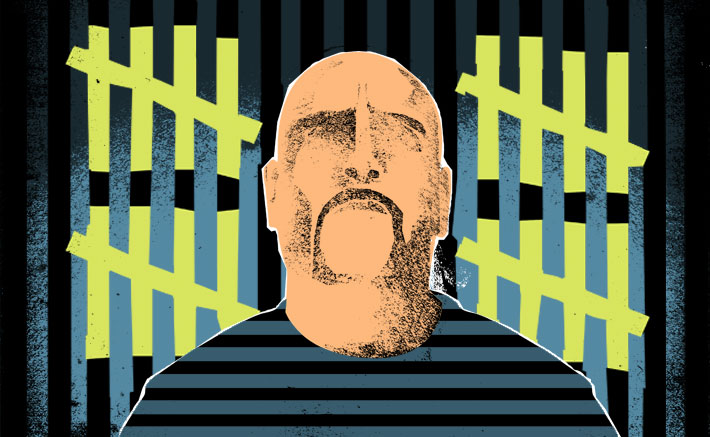
“So I listened to Tepperman’s case and he told me that there was a police officer at the time by the name of Perez working in the city who had been arrested on two occasions for molesting women,” he says. “And that Tepperman felt that Perez was guilty of these crimes. And they were branded the Silver Gun Rapist at the time.”
Huff then called the FBI. He got agent James Hughes, who corroborated Bower’s claim of being an informant, explaining that at that time there was a robbery ring that crashed stolen vans into the front of jewelry stores, looting them before escaping in getaway vans.
“Well, apparently, Bower witnessed one of these incidents and could identify the people and helped the FBI crack the case and make the arrests,” says Huff. “So he was considered credible with the FBI, which went a long way with me, too.”
Thus began, independent of Bower, a team of law enforcement officials bonded by an unlikely mission: to get to the truth, expose the facts behind the incarceration of an otherwise unknown prisoner—a part-time “square badge,” as Huff repeatedly refers to Bower’s role as a security guard at the mall who delivered newspapers on the side to make ends meet and feed his two young kids—and bring the true Silver Gun Rapist to justice.
It didn’t take Huff and his crew—which soon teamed up with Goldberg and, for a time, former DCJS Commissioner Paul Shechtman (who also investigated the case pro bono)—too long to put the pieces together. Getting those within criminal justice system’s halls of power to admit fault, right such an unbelievable wrong and hold accountable one of their own, however, would be another story entirely.
To date, Goldberg’s legal attempts—including appeals to a NYS appellate court, applications to the state Court of Appeals for reversals and Habeas Corpus petitions in federal court (which, to Bower’s family’s horror, was actually shredded “accidentally” while in the judge’s possession and needed to be resent)—have all been denied. Most recently, following a discussion with Navarra, Goldberg wrote a letter to the Queens District Attorney’s Office in an attempt to locate or at least determine the fate of a semen-stained piece of outer clothing recovered from one of the incidents Bower was convicted of. Ideally, the objective, Goldberg says, is to have it tested for DNA; at the minimum, find out what happened to it. The Queens District Attorney’s Office called one of Bower’s attorneys about it in 2003 before the potentially exonerating piece of evidence simply disappeared.
For Goldberg, the struggle to free Bower has been especially painful. Besides the legal setbacks, he lost his wife of 22 years, Linda Keenan, in 2009. Through years of correspondence with Bower, she had come to know him personally, and was a firm believer in his innocence.
Unless new evidence comes to light, Goldberg laments, Bower’s legal avenues are slim.
“I think it was vouchered,” Navarra says of the missing garment. “All those clothes should be re-tested. Test it. If it’s him, it’s him. If it’s not him, it’s not him.
“I have no qualms and helping if he’s not guilty or if he is guilty,” he adds. “I would feel good if I knew one way or the other.”
Never Say Die
To speak to Ronald Bower’s family—his brother Steven and mother Margaret—even just for a few minutes (a near-impossibility, due to their passion for him), is to get a small, microscopic glimpse of what sheer, complete, absolute, unadulterated emotional, physical and psychological agony looks like.
Theirs is a world in a state of perpetual torture. Utter pain. Devastating anguish.
The second-floor apartment they share in Flushing is evident of this. Each room in the modest two-bedroom houses a different shrine of photographs, mementos and religious icons dedicated to “Ronnie,” as they call him. Scattered throughout, hanging from the walls, are dozens of colorful acrylic paintings that Ron has made throughout the years from behind bars and mailed home for them: Mickey Mouse, horses. Each is emblazoned with short, heartfelt messages.
There are large paintings of Jesus Christ, miniature prayer cards of saints and rosary beads draped across photographs of Ronald at various stages of his life. In the living room towers a 7-foot-high wall of stuffed animals, clowns, toys and dozens upon dozens of knickknacks; again, lumped among framed photographs of Ronald in various poses, sometimes holding his two daughters Kristy, then 4, and Holly, 2. The toys, Mrs. Bower explains, keep her happy. Alongside the monolith squawks the family parrot, Mellon Head.
In many ways, this entire apartment is a massive, livable shrine to “Ronnie.” For both Steven and Margaret spend their existence consumed with the tragedy that has engulfed him.
Margaret, despite a paralyzed knee, arthritis, high blood pressure, cataracts, infantile paralysis that has left her left hand disfigured and a slew of other health issues, musters the strength to walk the several blocks to St. Michael’s every Saturday and light candles for the safe return of her son. She prays constantly. She cries a lot, too.
“Rescue Ronnie home,” she sobs, repeating the plea she constantly asks God. “Every single day and night I think of my son. He did not commit these crimes. He wouldn’t hurt a fly. God as my judgment. He’s a good son.”
Steve, currently unemployed and caring for his mother, has become an encyclopedic bastion of legalese and knowledge, reciting his brother’s plight chapter and verse, over and over, educated in law simply by living the nightmare and refusing to succumb to its depressing grip. As his constant calls to the judges that sparked Huff’s prison visit are evident, he is the epitome of relentlessness in his pursuit of “The Truth,” justice and freedom for his brother, delivering his assessments, like his brother, rapid-fire and with supreme conviction.
“It’s an outrage. It’s an atrocious outrage,” he says. “He’s innocent. It’s horrific. It’s disturbing what they did. And I would never give up until we get him home… until he’s vindicated. Until we expose this villainry that did this to him.”
“The emotional pain is just above and beyond,” he laments. “Depression isn’t the word for it. It’s very hard.”
True to the tragically bizarre nature of Bower’s tale, his current plight began, his family says, following an unfortunate incident with his ex-wife.






